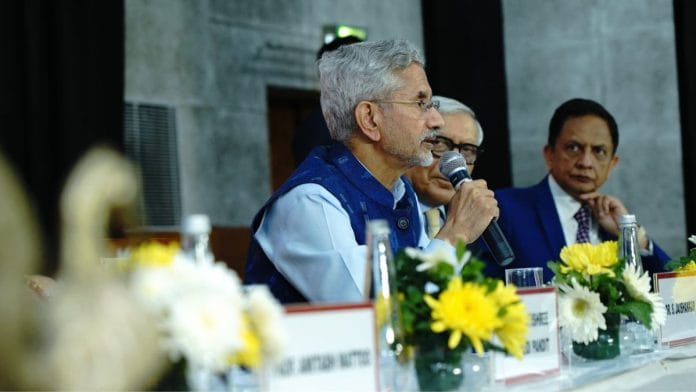New Delhi: India must “underwrite” infrastructure projects within its neighbourhood, if its ties are to be “proofed” against any political volatility, External Affairs Minister S. Jaishankar said Monday, indicating New Delhi’s growing interest in funding such projects amidst the growing shadow of China’s Belt and Road Initiative (BRI).
“In our own region, we have to ourselves underwrite the infrastructure for cooperation if it is to be proofed against political volatility. This is the essence of Neighbourhood First policy. India has to be the ‘go-to’ option in any crisis for the entire subcontinent,” Jaishankar said, speaking at the first Aravalli Summit hosted at the Jawaharlal Nehru University (JNU). On the day, the School of International Studies at the university also celebrated its 70th anniversary.
He added: “When you have a policy, the purpose of the policy is not to solve a problem. The purpose of the policy is to manage the relationships to your national advantage…It means giving resources, giving a kind of a political energy” to New Delhi’s neighbours.
The focus of India’s Neighbourhood First policy, Jaishankar further pointed out, is to “create enough of a basis for cooperation in which both parties have an interest” to act as a “stabilising factor” in ties, even if there’s any political disruption or change in the other countries.
India’s neighbourhood has seen a number of serious political changes in recent years. Just last month, Nepal witnessed a sweeping political shift, following anti-corruption protests, leading to the ouster of Prime Minister K.P. Sharma Oli, induction of a caretaker leader, and new elections on the horizon.
Last year, Bangladesh had witnessed its own “July Revolution” that had seen the ouster of Sheikh Hasina’s government, long considered to be close to India, and the assumption of power by Muhammad Yunus and an interim government in Dhaka.
Maldives, in September 2023, had elected Mohamed Muizzu as president. Muizzu had focussed on an “India Out” platform during his campaign, which has changed since he assumed the presidency, with both New Delhi and Malé patching up ties with reciprocal state visits by its leaders.
“I would argue that in many cases the changes that we have seen in the last few years, the consequences would have been more sharper, had actually this cooperative basis, and the infrastructure mostly underwritten by India had not been there,” explained Jaishankar.
The first Aravalli Summit and the celebration of 70 years of the School of International Studies also saw addresses made by JNU Chancellor Kanwal Sibal, Vice Chancellor Santishree Dhulipudi Pandit, SIS Dean Amitabh Mattoo, and Shishir Priyadarshi, president of Chintan Research Foundation.
Also Read: Jaishankar on trade deal with US—compromises needed on both ends, but India has ‘certain red lines’
India’s infra push amid shadow of BRI
India has also pivoted to focusing on infrastructure projects across its neighbourhood, and promoting transport corridors further afield with plans for establishment of the India-Middle East-Europe Economic Corridor (IMEC), for example.
Just last week, India announced two railway projects worth Rs 4,033 crore, connecting Bhutan with West Bengal and Assam, to showcase its growing infrastructure links in the region. The moves come as China’s cheque-book diplomacy—the Belt and Road Initiative—has grown in the decade since its inception, with investments worth almost $1 trillion spanning the globe.
China’s BRI has seen almost $62 billion worth of infrastructure projects connecting Pakistan’s mineral-rich Balochistan province with the port of Gwadar on the Arabian Sea as a part of the China-Pakistan Economic Corridor (CPEC).
Beijing has helped fund marquee infrastructure projects in the region, including Nepal’s Pokhara airport, and a number of such initiatives have been seen in both Sri Lanka and the Maldives. The BRI has helped extend China’s reach in India’s neighbourhood.
India has extended a number of financial instruments to the Maldives in the last year, and provided close to $4 billion in emergency financial assistance to Sri Lanka following the economic crisis after the COVID-19 pandemic.
“We need to become the ‘go-to’ country. Because we are the largest, we are the common neighbour to the entire region. But that does not proof against other interests they [neighbouring countries] may have or positions they may take. We can accommodate them to the extent our national interest allows them to do so,” said Jaishankar.
Furthermore, New Delhi has sought to expand its geographical links with focus on larger projects, such as IMEC, or the International North South Transportation Corridor (INSTC) connecting Russia with its Western Coast, or the International Trilateral Highway, connecting Moreh in Manipur with Mae Sot in Thailand.
“Re-engineering connectivity is vital today. Increasing our options through engagement in multiple directions is in progress. We can see that in the IMEC, the North-South Transport Corridor, the Trilateral Highway, the Polar routes, among others,” the minister further said.
India has focused on building the Chabahar port in Iran, with the aim of giving it access to Central Asia, bypassing Pakistan. However, the port has come under pressure, following the removal of waiver from US sanctions last month. India is also exploring new routes, such as the Eastern Maritime Corridor connecting Chennai with Russia’s Vladivostok.
All of this comes at a time when the global order is changing, and a “visceral” competition for control over critical minerals and rare earth elements is underway, while countries focus on ownership and security as a part of their economic agenda, highlighted Jaishankar.






